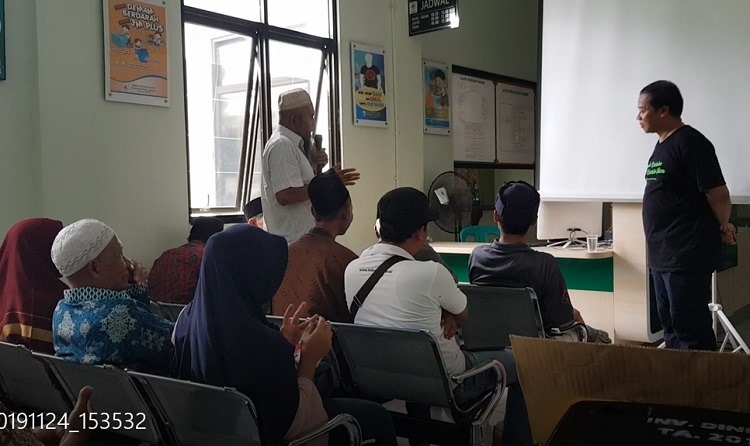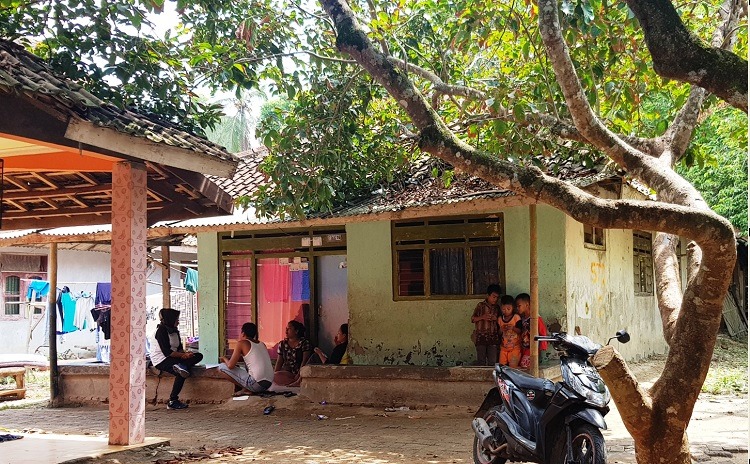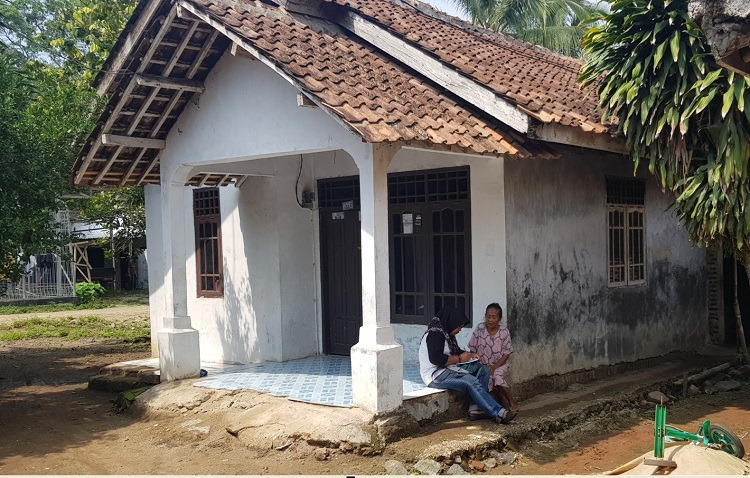Versi Bh. Indonesia
Empowering local communities is central to improving mental health
Eunike Sri Tyas Suci
Early one November morning, I rushed to the station to catch the first train to Rangkasbitung, the capital of Lebak, the westernmost district on Java. In just two hours, I travelled from Jakarta, Indonesia’s most modern metropolis, to a remote rural village, which could easily have been at the other end of the country. I was lucky to meet Maria, a mental health nurse, on the train. She was going to join our activities on the second day of our two-day mental health training and education program. The first day had been held at the Mandala puskesmas (community health centre) in Banten. Today, field activities were in Tambakbaya village, about five kilometres away. After arriving at Rangkasbitung train station, we drove to the village.
We were part of a team of about 10 people with different backgrounds but a shared mission to improve mental health in Lebak District. Our project was a collaboration between Bagus Utomo, the founder and head of the Indonesian Schizophrenia Care Community (KPSI), Novy Daulima, a mental health nurse, and myself, a health psychologist. Our project was funded by KPSI, and also by the Indonesian Association of Mental Health Nurses (IPKJI).
On the first day, we taught the staff of the puskesmas about mental health, the need for early detection, community mental health nursing, and the basics of empathic counselling. Novy led the program. Bagus opened the session by giving a speech about his experiences taking care of his brother with schizophrenia, and the many requests for assistance he receives as head of KPSI. I discussed counselling.

On the morning of the second day, we visited a rural community to assess the health status of its households. We split up into 10 small teams that collected information about 20 households each. All households were categorised as: healthy, at risk, or having someone with mental illness. Most people invited us to sit with them on their front veranda. Where houses contained more than one household, our teams made separate assessments of each. By the end of the day, we had reached 200 households and determined the health status of 668 people. We concluded that eight individuals were at risk and five had a mental illness. We sent our report to the head of the puskesmas, Dr Riris Siahaan, and to the local health department to be followed up.
What are health cadres and what do they do?
Kader (cadres) consist of volunteers selected from and by the community to assist the local puskesmas oversee the health of the community. They primarily focus on maternal and child health. According to the World Health Organisation, improvements in maternal and child health can be achieved through 'mid-level' or 'lay' health workers.
In Indonesia, each puskesmas organises training for these volunteers on nutrition, maternal and child health, family planning and infectious diseases. These kader then educate the community and promote a healthy lifestyle. Because they are part of the community, kader already know most of the people they are dealing with. The community accepts them. Many studies have demonstrated their significance in improving maternal and child health. In monthly travelling clinics, the kader provide health education and record height and weight measurements for all children under five. Because of their trusted position in the community, kader are often invited to conduct additional government health programs, including monitoring non-communicable diseases and the health of elderly people.
The IPKJI has developed training programs in community mental health nursing that build capacity in local kader, transforming them into dedicated mental health teams. These types of training programs were developed after the 2004 Boxing Day tsunami in Aceh where mental health nurses and cadres worked to identify individuals in need of mental health assistance due to traumas they had suffered from the tsunami and civil war. Subsequently, there were plans to replicate the program throughout the country. Some studies have shown a significant positive impact from the training. Drawing on this, Novy had proposed to use a community mental health training module in Banten.
Mental health in Banten
On World Mental Health Day in 2015, the governor of Banten, Rano Karno, launched the Banten Bebas Pasung 2019 (Banten Free of Restraints by 2019) initiative. Unfortunately, 2019 has now passed and pasung (the practice of using physical restraints on people with severe mental disorders) is still found in some of Banten’s remote areas. Although the number of cases has decreased significantly nation-wide, some local health departments say they do not have the funds to eradicate it completely. Many health departments seek training and support to achieve this goal.
The head of Lebak Health Department’s Infectious Disease Eradication and Environmental Health Division, Dr Firman Rahmatullah, enthusiastically welcomed us when we visited him to discuss our plans. Mental health is his responsibility. He had recommended the Mandala puskesmas and one other health centre, where we conducted our training. He called Dr Riris on the spot and she responded positively as well. Mandala puskesmas has been active in promoting mental health. Dr Riris has a relative with mental illness, which could be one of the reasons she was interested.
Improving mental health awareness
The afternoon of the second day was spent raising mental health awareness among religious and community leaders. The meeting took place in the puskesmas. The mental health kader joined as well so that local leaders could get to know the people they could ask for assistance later. Bagus opened the meeting by talking about caring for his brother with schizophrenia; I followed by discussing mental health in general. We then watched a short documentary, Memory of My Face, the true story of Bambang Rudjito, who was diagnosed with schizoaffective disorder and admitted to a psychiatric hospital. The documentary follows his life and ends with Bambang fully recovered and married. The audience found this documentary deeply moving, with participants realising that mental illness can be treated.
Following the movie, we held a long discussion. To my surprise, participants were very concerned about the mental health of their community. Up front sat a young man with a long beard, wearing long and loose trousers and a dark local hat, indicating he was a devout Muslim. He was very quiet and we were worried he disagreed with what we were saying because it did not accord with his religious beliefs. But when we asked his opinion, he said he would do everything he could to ensure the whole community could be mentally healthy. To achieve this, he thought that everybody should be ikhlas (open-hearted and sincere while accepting themselves for who they are). Learning to be ikhlas, he thought, would free us from mental burdens. Even though his reasoning was different from our own, we had come to the same conclusion: mental health is important.
A community leader asked us about the difference between sakit syaraf (neurological illness) and sakit jiwa (mental illness). This was a good question because the term sakit syaraf is commonly used to describe someone with a mental illness. Most people believe that something is wrong with someone’s brain or mind when they do strange or 'crazy' things; sakit syaraf is generally used to describe crazy people. The community leader hit on the importance of treatment and medication for mental health:

Please help us provide community members who suffer from mental illness with medication. I will bring them to the puskesmas. There are two of them wandering around still wearing clothes [many are naked], and one more is still at home. I hope one day there will be a minister responsible specifically for mental health.
When he asked for a Minister of Mental Health, people loudly supported the idea. The audience applauded enthusiastically, and the room was full of smiles. We were stunned by the positivity of the response.
Three key lessons
During our visit, we learned three lessons. First, a collaborative program involving several professions and a grassroots organisation can be very effective. Because organisations of individuals with a lived experience of mental illness and their caregivers like KPSI represent the individuals who are the target of mental health services, it is important to listen to them and understand their needs. Second, increasing the role of kader to identify individuals with mental illness and promote mental health in the community should always be done in cooperation with the local puskesmas. Most kader are already busy because they are involved in a variety of health initiatives. Third, follow-up is very important to evaluate the effectiveness of training and education programs, and to find out whether improvements are needed.
Unfortunately, we did not have a chance to follow up on our training program because Lebak District experienced serious flooding during the rainy season. Mandala puskesmas and the village suffered badly and needed time to recover. While waiting for a better time to visit, COVID-19 arrived and we had to put field activities on hold. When we have the opportunity, we will return to Mandala puskesmas as soon as we can.
Eunike Sri Tyas Suci (eunike.suci@atmajaya.ac.id) is associated with the Department of Psychology at Atma Jaya Catholic University of Indonesia in Jakarta. She is the head of the Indonesian Health Psychology Association. She has published on addiction and various issues in health psychology.
